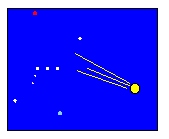 |
Astronomical Opportunities |


|
for Bucknell Students |
 |
Astronomical Opportunities |


|
for Bucknell Students |
Students interested in concentrating their studies in astronomy are encouraged to major in Physics and take ASTR 201 and 301 as electives for that major. Additional opportunities for advanced study and/or research participation are available through Independent Research or Honors Thesis programs (see below). In-depth exposure to astronomical research is available through our summer research program.
Interested non-majors can obtain a general exposure to astronomy through the ASTR 101-102 survey sequence. The motivated student can follow this up as a Teaching Assistant for this sequence. Many TA's are non-majors and it's a great opportunity for those interested in teaching (especially science teaching) careers.
Astronomy Courses Offered |
||
Astronomy 101-102 | Students interested in a non-technical introduction to astronomy are encouraged to take the ASTR 101 and/or ASTR 102 survey courses. These courses are designed to introduce students to the way astronomy is done and concentrates on how we know what we know about the universe. Neither course has a prerequisite, and each qualify as lab science courses for non-majors. | ASTR 101 Course Guide Description |
Astronomy 201 | Observational Astronomy, ASTR 201, covers the methodology of astronomy including the design and operation of telescopes, as well as data acquisition and analysis. In this sophomore level course, students learn to operate the Observatory's telescopes, CCD cameras, and spectrograph. The design and carry out their own observational experiments, analyze their data, and report their results. | 2001 Course Description
|
Astronomy 301 | Theoretical Astronomy, ASTR 301, concentrates on the physical processes that produce the astrophysical phenomena we observe. This course is generally taken by junior and senior physics majors, and provides them with an opportunity to apply much of the core physics they've learned in a literally alien environment. | 2002 Course Description
|
Other Astronomy Education Opportunities |
||
Independent Research (PHYS 350) | Advanced students can participate in ongoing astronomy research activities, either as part of an independent study program or as an Honors Thesis. Recent projects completed by students include a study of the abundance ratio of carbon monoxide isotopomers in molecular clouds, and the design and development of a fiber-fed spectrograph for the Bucknell Observatory. | |
PHYS 329-330 | The advanced laboratory program for upper level physics majors contains several astronomical experiments involving telescope operation, CCD imaging, and image data analysis. Additional experiments including astronomical spectroscopy and radio astronomical observing are currently under development. | |
Astronomy 101-102 Teaching Assistantships |
Astronomy Teaching Assistants help with the laboratory and nighttime observing components of the Astronomy 101-102 sequence. This is a great opportunity to reinforce your astronomy education and to learn how the Observatory's equipment works. Teaching Assistants are selected from students who have completed either ASTR 101 or 102, based on their performance in class and lab, and their interest in working with their peers in a lab environment. It is not required that the TA be a Physics major; in fact, most aren't. | |
Summer Research Projects |
Opportunities for in-depth summer research are available through the Physics Department's Research Experiences for Undergraduates (REU) Program. Students in the ten-week program often make observations at off-campus research facilities facilities such as the IRAM 30-m Telescope in Granda, Spain, the Mopra 22-m Radio Telescope near Coonabarabran, Australia, and the MIT/Haystack 37-m Radio Telescope in Westford, MA. | |
This page is maintained by Ned Ladd, ladd@bucknell.edu
